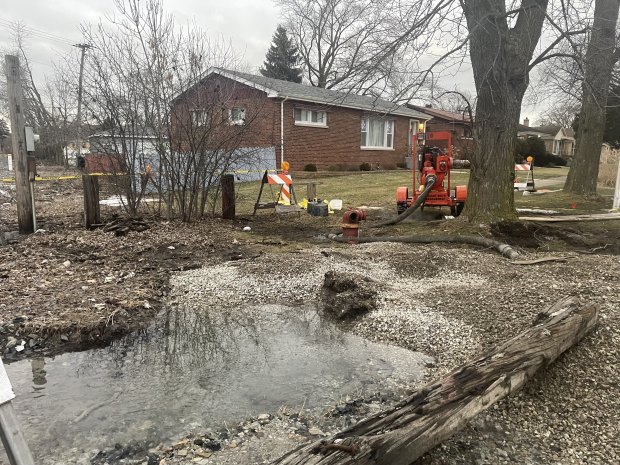Where West 119th Street meets the railroad tracks at the east side of Mount Hope Cemetery, there is a red brick house so pristine inside it looks like no one has lived there for weeks. That’s because no one has lived there for weeks.
Vanessa Macias, 36, bought the home three years ago when she fell in love with the new floors, spacious basement and large backyard. But in December, a water main belonging to the village of Robbins burst under the tracks that skirt Merrionette Park, causing the cemetery and Macias’ backyard to flood.
Because Robbins Mayor Darren Bryant says the south suburb can’t afford to fix it and the leak is outside of Chicago’s city limits, the timeline of when this water main will be repaired is unclear.
In the meantime, the Chicago Department of Water Management has put a water pump 2 feet from Macias’ lawn with a hose that moves water from the break to a sidewalk manhole as a flood prevention measure. Aside from not being a long-term fix, it is a disruptive short-term solution that omits a loud noise preventing Macias and her partner, Manuel Gomez, 40, from spending long periods in their home.
“We’re staying at my father’s. He owns a building in Brighton Park,” said Gomez, who manages a chain of auto body shops on the South Side. “It’s just extremely too loud over here, to the point where we can’t sleep.”
When they get home from work, Gomez and Macias, a Sawyer Elementary School teacher, normally look forward to watching basketball and making dinner. But 10 yards outside their wall is a machine omitting a constant low, monotone roar that infiltrates their bedroom, living room and kitchen. It overpowered even the loud speakers broadcasting the fourth quarter of the Brooklyn Nets-Golden State Warriors game.
Vanessa Macias says the fence at her house on 119th Street is rotted at the bottom because of water from a water main break, and will likley have to be replaced. (Hank Sanders/Daily Southtown)
“When I noticed that our yard was completely flooded and the bottom of our fence started to rot, I called (311) again, and then I called the alderman’s office,” Macias said. It took her four days of calling until Jan. 3, when the city, contractors for Robbins and Cook County came to check.
“They were all out there trying to figure out who was going to take care of what,” she said.
Bryant last week referred the Daily Southtown to the state, Cook County and the city of Chicago in response to when the leak will be fixed, saying the village cannot afford the $250,000 price tag quoted without state funds.
A spokesman for the Chicago Department of Water Management said the water main is Robbins’ property and the village’s responsibility to fix, although the department is pumping the water to prevent flooding in Chicago basements.
Natalia Derevyanny, the director of communications for the Cook County Bureau of Administration, said the county has hired a contractor to diagnose and repair the leaks in the water main, even though the responsibility lies with the village.
“Cook County has invested significant resources to assist them,” Derevyanny said.
The county is still working on a timeline, but in the meantime, the pump — and its sound — continues to wreak havoc for area residents.
According to a decibel reader from an iPhone application, right next to the pump registers about 105 decibels (dB), similar to the sound emitted by a jackhammer.

In Marcias’ and Gomez’s bedroom, the sound ranges from high 60 to low 70 dB which “may cause hearing damage or lead to hearing loss,” according to the website for the application Decibel Meter Pro.
Sound is not the only problem for residents living near 2600 W 119th Street. Marcias said her water pressure has decreased, there is a rotten smell in her basement and she expects her front lawn and side fence will need to be replaced because of rot at the base.
“I know it’s going to cost an arm and a leg,” she said. “The fence is bad.”
“It’s garbage,” Gomez said.
David Cherry, a Chicago police officer, and his girlfriend Daniela Hall, a manager for a rental car company, live three doors down from the pump, so it’s quieter and the effect on their lives is less severe.
“I’m very much aware of it at all times,” Cherry, 31, said. “You start to get used to it.”
They haven’t felt the need to move. But Cherry and Hall, 30, agreed the way municipal leadership has kept them in the dark about what’s been going on a few yards from their home increases their stress.
In fact, Hall said she first learned why the pump was on their corner when she read the Jan 31 story in the Daily Southtown.
“I don’t appreciate the lack of transparency. I would like to know when something’s going on that could be a potential issue, that could be a potential noise complaint,” said Cherry. “Not knowing how long I could have to put up with that, that seems kind of nerve wracking.”
hsanders@chicagotribune.com



